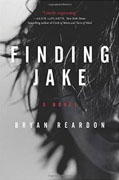Finding Jake
Bryan Reardon
book reviews:
· general fiction
· chick lit/romance
· sci-fi/fantasy
· graphic novels
· nonfiction
· audio books
· author interviews
· children's books @
curledupkids.com
· DVD reviews @
curledupdvd.com
newsletter
win books
buy online
links
home
for authors
& publishers
for reviewers

 |
Finding Jake Bryan Reardon William Morrow Hardcover 272 pages February 2015 |
|
This country isn’t conversant with atrocities and their aftermath, especially domestic ones like the mass shootings of schoolchildren by their peers. But it is a recurring reality in a culture at war with gun laws and constitutional rights, the argument raging while children continue to pay the price of the adults’ inability to achieve compromise. Finding Jake
There’s some argument for biology here. Allowing for oversimplification, even a first-time mother often intuitively finds that balance between self and child, the gestation process preparing the way, a physical state fathers don’t experience. While the mother, simply by means of biology, might understand the distinction between needs and wants in a demanding child, a man doesn’t experience the physical connectedness of the child-bearer, or had months to process the existential weight of childbirth and all its ramifications. This is only conjecture and not relevant, but such nature-given instincts have a bearing on Connelly’s self-taught parenting learning curve and his handling of the crisis that befalls his family. His personal experience adds drama to a novel that examines the potential involvement of a child in an unthinkable crime, but the larger argument is sensationalized by events. Chapters move between then and now, Simon examining his failures from the beginning to the suspense of not knowing the fate of his son. There is another, less visible dynamic: the parenting roles of Simon and Rachel. While Rachel’s mothering instincts don’t seem to suffer from her engagement outside the home, she continues to provide the force of her certainty to the family dynamic. Simon is secretly thrilled that Laney is so like her mother in temperament (easier to handle), identifying more clearly with his son from the start. Yet it is telling: nothing is left to the imagination where Simon is concerned, albeit laced with unrelenting self-examination: “Could it be that I have thought too much but not enough?” This is Jake’s story, but one dominated by his well-intentioned father, subject to the human failures inherent in his role, a paean to modern parenting in a society that has lost perspective, like Simon confronted by an exhausted Rachel: “That brain of yours, that whirling dervish of what ifs, is probably picking through every moment of the past, trying to find out how you caused this.” Regardless how the tragedy and its media-inflamed aftermath evolve, the identity of a beloved child resides in the secret hearts of his family, truth obscured by doubts and fears. Real healing requires not only acceptance but humility. Originally published on Curled Up With A Good Book at www.curledup.com. © Luan Gaines, 2015 |
|
|
|
 Click here to learn more about this month's sponsor! |
|
| fiction · sf/f · comic books · nonfiction · audio newsletter · free book contest · buy books online review index · links · · authors & publishers reviewers |
|
| site by ELBO Computing Resources, Inc. | |
 In a neighborhood of moms, Simon Connelly is an anomaly, a man still working through his acceptance of role-reversal, let alone the social niceties of navigating play dates and children’s birthday parties. Reluctant to embrace a situation where he is the only male, Simon tends to give in to Jake’s natural reticence and refuse. But when sister Laney comes along, a gregarious, sunny child, it is clear that her needs are far different than Jake’s. Simon must once more question the wisdom of his decisions--usually with the careful prodding of a supportive wife, who understands her husband’s inner conflicts, his worry over child-rearing mistakes. The issue becomes one of caretaking: are fathers able to play the same role as mothers, especially when guiding the emotional growth of children past infancy? Given the number of working mothers who continue to pursue careers, this once-unusual phenomenon becomes more relevant. (Many of Simon’s concerns feel an extension of the author’s own perspective, rather than originating with the protagonist, Simon often reeling with self-doubt over issues too finely examined.)
In a neighborhood of moms, Simon Connelly is an anomaly, a man still working through his acceptance of role-reversal, let alone the social niceties of navigating play dates and children’s birthday parties. Reluctant to embrace a situation where he is the only male, Simon tends to give in to Jake’s natural reticence and refuse. But when sister Laney comes along, a gregarious, sunny child, it is clear that her needs are far different than Jake’s. Simon must once more question the wisdom of his decisions--usually with the careful prodding of a supportive wife, who understands her husband’s inner conflicts, his worry over child-rearing mistakes. The issue becomes one of caretaking: are fathers able to play the same role as mothers, especially when guiding the emotional growth of children past infancy? Given the number of working mothers who continue to pursue careers, this once-unusual phenomenon becomes more relevant. (Many of Simon’s concerns feel an extension of the author’s own perspective, rather than originating with the protagonist, Simon often reeling with self-doubt over issues too finely examined.)